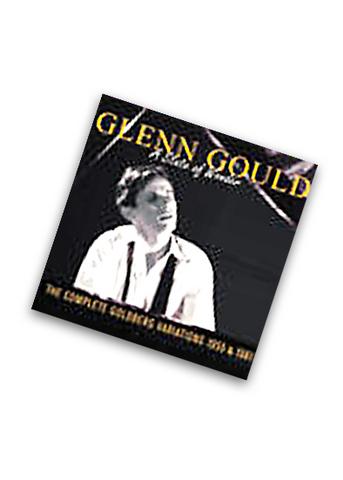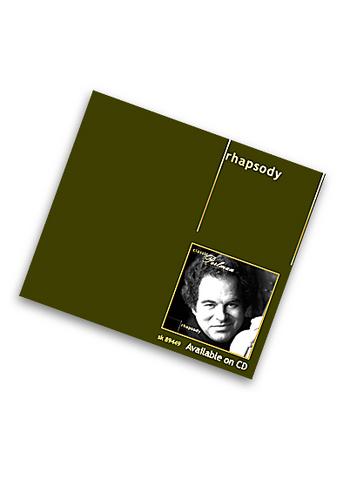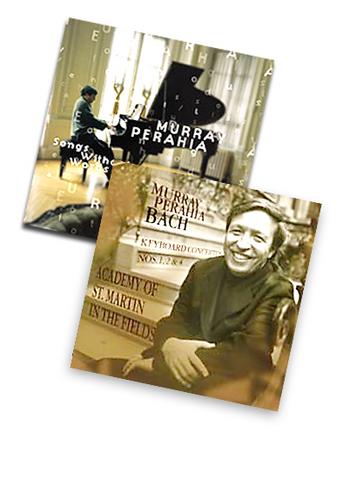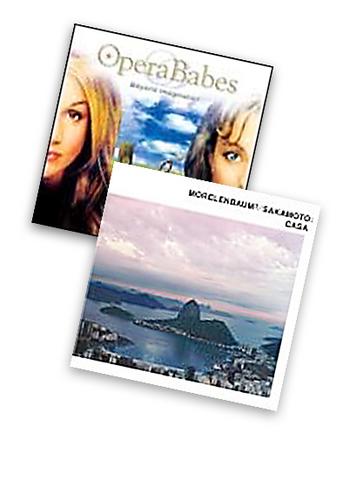Whether or not Bach's keyboard music should be played on a modern piano is a subject that has been debated for so long there would appear to be nothing new to say about it. What should have been the last word was spoken long ago by Rosalyn Tureck. This music, she said, is essentially abstract, and can therefore be played on virtually anything.
Tureck's own legendary 1953 recording of Bach's Well-Tempered Clavier is now available on four CDs from Deutsche Grammophon (463 305-2). You can read a mini-debate on its merits at www.amazon.com. Despite the boxed-in mono sound and some residual tape hiss, it is incomparable. The individual character Tureck gives to each of the 96 tracks is totally astonishing. It converted me overnight to what she calls "the bible of Western music."
Glenn Gould: A State of Wonder

Sony Classical Legacy
SM3K 87703
This repackaging of the two recordings Gould made of Bach's Goldberg Variations offers remastered versions of both. They date from 1955 and 1981 and are very different. But what is particularly valuable is the inclusion of a third, "bonus" CD. This contains the interview Gould gave to music critic and radio journalist Tim Page in 1982 discussing the two recordings. It's hilarious in places, but Gould's thoughts on Bach, and on his younger self playing this music, is something all music-lovers should possess. The first version was one of the most famous recordings ever made, selling in enormous numbers, often to people who'd never bought a classical record before and maybe never did again. But Gould in the interview is rather embarrassed by his youthful excesses, and some critics have indeed called his interpretation eccentric. Those who have long loved it will be hard to persuade of the 1981 version's superiority, however, especially with Gould singing along very audibly on many tracks. The "bonus" CD ends with 12 minutes of takes from the 1955 recording sessions during which Gould demonstrates how God Save the Queen and The Star-Spangled Banner can be played simultaneously so long as you begin half-way through the first. All in all, these three CDs are pure gold. They would make the ideal Christmas present for just about anyone you know, yourself included.

Volodos: Solo Piano Works
Sony Classical
SK 89647

Music promoters have for 20 years been struggling to find a pianist with the popular appeal of Glenn Gould. A current favorite is the 30-year-old Russian, Arcadi Volodos. Here he plays two Schubert sonatas, numbers 1 and 18, with great tenderness, and ends with Liszt's transcription of the penultimate song in Schubert's Die Schone Mullerin cycle in which the miller drowns himself. This sad ending is especially appropriate in that these recordings were the last ones made in Vienna's venerable Sofiensaal before it burnt down in 2001.
Murray Perahia: Songs without Words
Sony Classical

SK 66511
Murray Perahia: Bach Keyboard Concertos
Sony Classical
SK 89690
Perahia also includes four Liszt transcriptions of Schubert songs on the first of these CDs. The CD is otherwise occupied with 15 of Mendelssohn's Songs Without Words, so beloved of mid-19th century amateur and concert pianists, and four of Busoni's piano versions of Bach choral numbers. All items are played with Perahia's usual unostentatious artistry, and might even succeed in giving Mendelssohn's deceptively smooth-sounding style some new admirers.
The second CD contains Bach's keyboard concertos numbers 3, 5, 6 and 7, played on a piano by Perahia while simultaneously conducting London's Academy of St Martin in the Fields instrumentalists. These, usually referred to as Bach's Clavier Concertos, aren't the greatest music in the world, but Perahia plays their solo parts with wit and charm nonetheless.
Classic Perlman: Rhapsody
Sony Classical
SK 89449
Itzhak Perlman already has a large following in Taiwan, but this compilation CD, with several famous artists (Yo-Yo Ma, Daniel Barenboim) in attendance, will serve any newcomers as a convenient introduction to the warm-hearted violinist who plays sitting down due to a childhood bout of polio.
Morelenbaum2/ Sakamoto: Casa
Sony Classical
SK 89982
Opera Babes: Beyond Imagination
Sony Classical
SK 89916
These are two semi-classical items. The first consists of laid-back Brazilian songs, sometimes in Portuguese, sometimes in English sung by Paula Morelenbaum, accompanied by Jacques Morelenbaum (cello) and Ryuichi Sakamoto (piano). The items are beautifully recorded, if rather unvaried in style when heard one after another. The second CD is of famous opera arias with the addition of frequently brutal drumming. The Opera Babes may have been good enough for the 2002 World Cup organizers, but any genuine opera-lover will recognize them for what they are, an execrable travesty.

This is the year that the demographic crisis will begin to impact people’s lives. This will create pressures on treatment and hiring of foreigners. Regardless of whatever technological breakthroughs happen, the real value will come from digesting and productively applying existing technologies in new and creative ways. INTRODUCING BASIC SERVICES BREAKDOWNS At some point soon, we will begin to witness a breakdown in basic services. Initially, it will be limited and sporadic, but the frequency and newsworthiness of the incidents will only continue to accelerate dramatically in the coming years. Here in central Taiwan, many basic services are severely understaffed, and

Jan. 5 to Jan. 11 Of the more than 3,000km of sugar railway that once criss-crossed central and southern Taiwan, just 16.1km remain in operation today. By the time Dafydd Fell began photographing the network in earnest in 1994, it was already well past its heyday. The system had been significantly cut back, leaving behind abandoned stations, rusting rolling stock and crumbling facilities. This reduction continued during the five years of his documentation, adding urgency to his task. As passenger services had already ceased by then, Fell had to wait for the sugarcane harvest season each year, which typically ran from

It is a soulful folk song, filled with feeling and history: A love-stricken young man tells God about his hopes and dreams of happiness. Generations of Uighurs, the Turkic ethnic minority in China’s Xinjiang region, have played it at parties and weddings. But today, if they download it, play it or share it online, they risk ending up in prison. Besh pede, a popular Uighur folk ballad, is among dozens of Uighur-language songs that have been deemed “problematic” by Xinjiang authorities, according to a recording of a meeting held by police and other local officials in the historic city of Kashgar in

It’s a good thing that 2025 is over. Yes, I fully expect we will look back on the year with nostalgia, once we have experienced this year and 2027. Traditionally at New Years much discourse is devoted to discussing what happened the previous year. Let’s have a look at what didn’t happen. Many bad things did not happen. The People’s Republic of China (PRC) did not attack Taiwan. We didn’t have a massive, destructive earthquake or drought. We didn’t have a major human pandemic. No widespread unemployment or other destructive social events. Nothing serious was done about Taiwan’s swelling birth rate catastrophe.